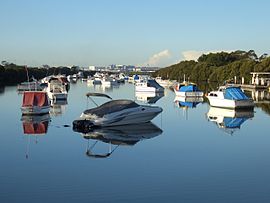Kyeemagh, New South Wales
|
Kyeemagh Sydney, New South Wales |
|||||||||||||
|---|---|---|---|---|---|---|---|---|---|---|---|---|---|

Muddy Creek
|
|||||||||||||
| Population | 790 (2006 census) | ||||||||||||
| Postcode(s) | 2216 | ||||||||||||
| Location | 12 km (7 mi) south of Sydney CBD | ||||||||||||
| LGA(s) | Bayside Council | ||||||||||||
| State electorate(s) | Rockdale | ||||||||||||
| Federal Division(s) | Barton | ||||||||||||
|
|||||||||||||
Kyeemagh is a suburb in southern Sydney, in the state of New South Wales, Australia. It is 12 kilometres south of the Sydney central business district, on the western shore of Botany Bay. Kyeemagh is in the local government area of the Bayside Council and is part of the St George area.
Kyeemagh is an Aboriginal name meaning 'beautiful dawn'. Prior to European settlement it was part of the lands of the Cadigal people.
The name of the suburb was adopted from the name of the Polo Ground established in the area in 1929 (Sydney Morning Herald 4 July 1929 p15). To provide better access to the ground from the north a new bridge was constructed over the Cook's River (Sydney Morning Herald 28 June 1930 p20). The new polo ground was also used for playing cricket (Sydney Morning Herald-various dates-see internet).
In the 1920s the area was known as North Brighton. A map of the area showing the existing streets was included in the Commonwealth Electoral Rolls of that period.
The area between the Cooks River and Georges River was originally known as Seven Mile Beach. It was changed to Lady Robinson’s Beach in 1874 to honour Governor Sir Hercules Robinson’s wife. Cook Park is named after Samuel Cook who advocated it as a public pleasure area.
John Webb was given a 300-acre (1.2 km2) land grant in 1837 but did not settle on the land because it was too scrubby and arid for farming. In 1882, 309 acres (1.25 km2) were resumed for a sewage farm and another 311 acres (1.26 km2) were added later. The sewage farm was discontinued in 1916 when an ocean outfall was built and subdivision took place.
John Goode had property in West Botany Street, from which he built a private road to Seven Mile Beach, as Lady Robinsons Beach was known then. Goode Street was named in his honour, but this later became Bestic Street. Maps (Commonwealth Electoral Rolls, 1925, 1928) show a second street named in honour of John Goode, off Bestic Street.
...
Wikipedia
